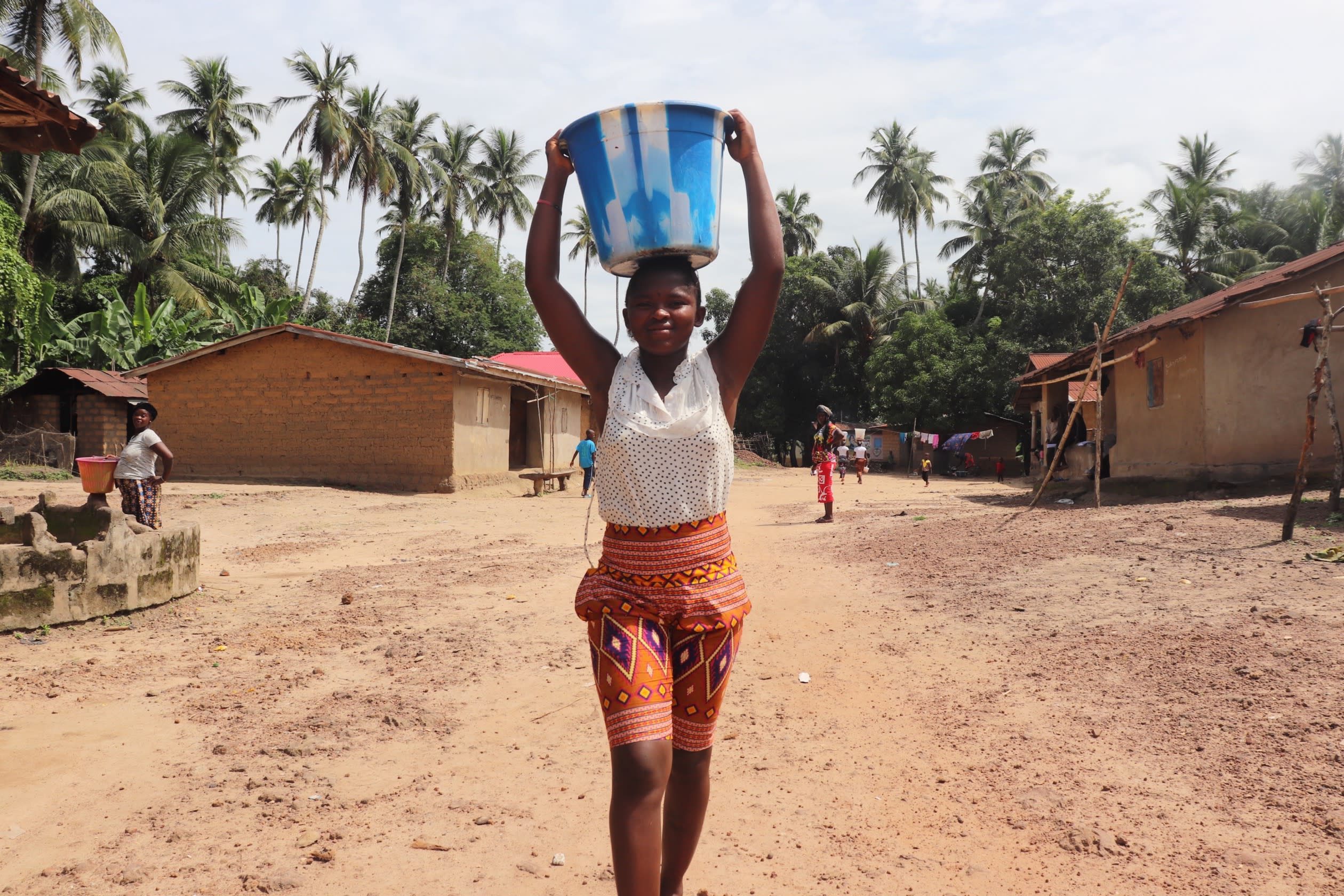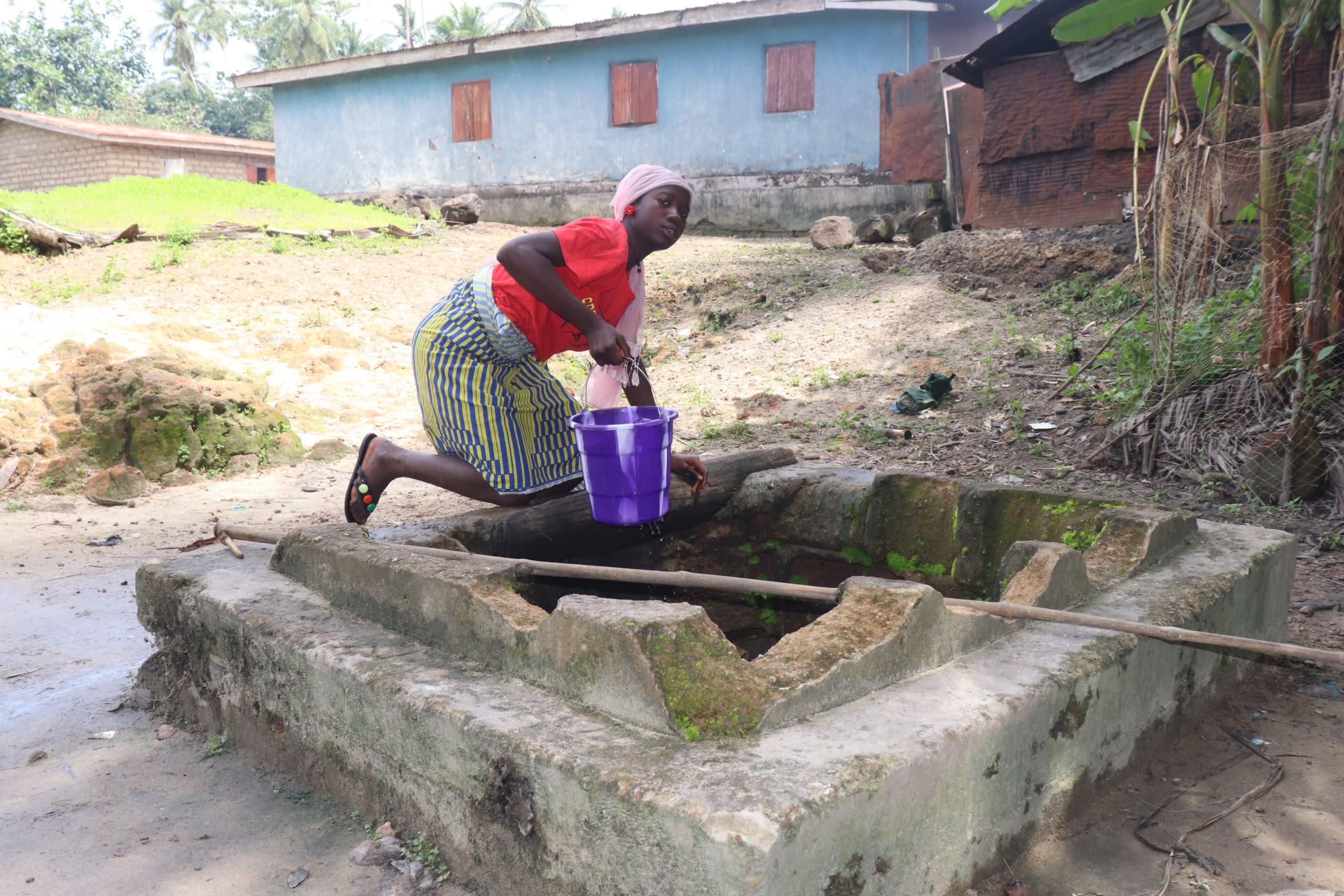August, 2022: Benkia Community Well Rehabilitation Complete!
We are excited to share that a safe, reliable water point at Benkia Community 2 in Sierra Leone is now providing clean water to neighboring community members! We also conducted hygiene and sanitation training, which focused on healthy practices such as handwashing and using latrines.
"Before, I faced a lot of problems accessing water," said 14-year-old Saidu B.

Saidu splashes water while community members celebrate around him.
"The only water well in the community dries [out] every dry season and the water is not chlorinated," Saidu continued. "The option I could get access to is stream water, which is not pure to drink. Due to [the] contaminated water in the community, [the community and] I usually experience diarrhea."
"Today, I have access to reliable, safe, and pure water in my community. This water [is] going to contribute to my health. As the adage says, 'water na life' (water is life). I want to take this opportunity to say thanks to [everyone involved] for their good work. I am very happy because the pump is now providing enough water which I can fetch to my house. The pump is not far from my house, and I can fetch more trips of water any time easily.
"I was worried about getting safe water to drink in this village," said 28-year-old farmer Memunatu Sesay. "The water that I used to drink from various sources was not clean. There had always been difficulties accessing water when this water well got dry."

Memunatu pours water at the dedication ceremony.
"This is a great day in this village because we are getting a decent and clean water point," Memunatu continued. "The water from this pump is very clean and the water well is fenced, and this is [preventing] animals that might go inside the well to drink water and contaminate the area after drinking.
"It was difficult for me to prepare food on time after coming [home] from work on the farm. I had to fetch water from the stream to start preparing food for my family. It was not an easy task to complete because I had constraints on getting access to adequate water to prepare food. It was again not easy to fetch enough water for everyone in my family to bathe. My house would go a whole night without a single bucket of water to drink, and I would rush to the stream to fetch water very early in the morning before doing any other task.
"It is a very good moment that I am seeing clean and sufficient water running from the pump," Memunatu concluded. "My constraints on fetching water from the stream are now over."

We held a dedication ceremony to officially hand over the well to the community members. Several local dignitaries attended the ceremony, including representatives from the Port Loko District Council and the Ministry of Water Resources. Community members beat Bondo drums and sang in their local language (Temne), praising God for giving them access to water in their community.

Each official gave a short speech thanking everyone who contributed to the rehabilitation of the water project and reminding everyone to take good care of it. Then, Memunatu and Saidu made statements on their community's behalf. The ceremony concluded with more celebration, singing, and dancing.
Clean Water Restored
The drill team arrived the day before beginning work. They set up camp and unpacked all their tools and supplies to prepare for drilling the next day. The community provided space for the team to store their belongings and meals for the duration of their stay. The following day, the work began.
First, we raised the tripod, the structure we use to hold and maneuver each drilling tool. Next, we measured the well's original depth. We then socketed the pipes and installed a casing.

Finally, we lined up the drill rods and started to drill! We reached a final depth of 14 meters with water at six meters. The hand-drill method allowed the team to install the cylinder far below the aquifer so that the community has excellent water access throughout the year.
With drilling complete, we installed screening and a filter pack to keep out debris when the water is pumped. We then cemented an iron rod to the well lining and fixed it with an iron collar at the top.

Next, we bailed the well by hand for three days and flushed it, clearing any debris generated by the drilling process. Finally, we tested the yield to ensure the well would provide clean water with minimal effort at the pump.
As the project neared completion, we built a new cement platform, walls, and drainage system around the well to seal it off from surface-level contaminants. The drainage system helps to redirect runoff and spilled water to help avoid standing water at the well, which can be uncomfortable and unhygienic and a breeding ground for disease-carrying mosquitoes.

At last, we installed the pump and conducted a water quality test. The test results showed that this was clean water fit for drinking!
New Knowledge
Before conducting any hygiene training, we called and visited the local water user committee to understand the community’s challenges and lack of sanitation facilities. We shared the findings from our discussions with the committee members to help them make the necessary adjustments before the training began. For example, we identified households without handwashing stations or ones that may need to repair their latrines. With this information, community members worked together to improve hygiene and sanitation at home.
After this preparatory period, we scheduled a time when members from each household using the water point could attend a three-day hygiene and sanitation training. We then dispatched our teams to the agreed-upon location to hold the meeting.

Training topics covered included handwashing and tippy taps, good and bad hygiene habits, disease transmission and prevention, COVID-19, worms and parasites, dental hygiene, proper care of the well's pump, keeping the water clean, the cost recovery system, dish racks and clotheslines, the importance of toilets, keeping latrines clean, balanced diets, the diarrhea doll, and HIV and AIDS.
53-year-old Swaibu Bangura came away from the training with new knowledge. "I am very confident that this training was so much important to me and, I believe, also to my fellow community members, especially women who are also mothers," Swaibu said.

Swaibu at the training.
"The knowledge from this training is essential to our daily lives, especially in caring for ourselves, [our] environment, [and the] food and water that we use. Today I have learned that we should not do any laundry close to our drinking sources because we will end up drinking the [soap in our] water because that very soapy water will be drained into the pump. I have also learned that we get sicknesses like typhoid, diarrhea, worms, or even skin infection as a result of contaminated food and water.

"This training has also helped me understand the value of using latrines and dishracks in protecting ourselves since we have domestic animals like fowl, dogs, ducks, and even insects that transmit diseases to us. I strongly believe that if we all try to follow this advice, we will live better lives in this community."
Conclusion
This project required a substantial collaboration between our staff, our in-country teams, and the community members themselves. When an issue arises concerning the well, community members are equipped with the necessary skills to rectify the problem and ensure the water point works appropriately. However, if the issue is beyond their capabilities, they can contact their local field officers to assist them.
Also, we will continue to offer them unmatchable support as a part of our monitoring and maintenance program. We walk with each community, problem-solving together when they face challenges with functionality, seasonality, or water quality. Together, all these components help us strive for enduring access to reliable, clean, and safe water for this community.
With your contribution, one more piece has been added to a large puzzle of water projects. In our target areas, we’re working toward complete coverage of reliable, maintained water sources within a 30-minute round trip for each community, household, school, and health center. With this in mind, search through our upcoming projects to see which community you can help next!
Thank you for making all of this possible!




 Borehole Well and Hand Pump
Borehole Well and Hand Pump
































